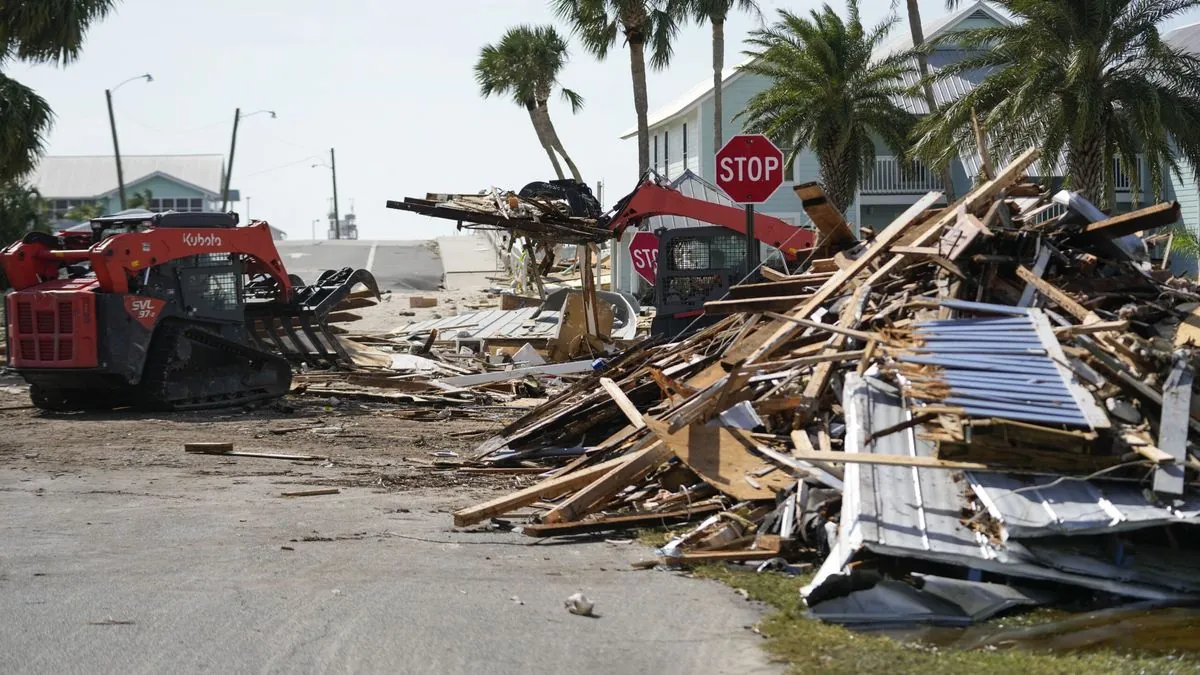In the wake of Hurricane Helene's recent devastation across the southeastern United States, a new challenge has emerged: a deluge of misinformation on social media platforms. This digital storm of false rumors and conspiracy theories is threatening to complicate rescue and recovery efforts in affected areas.
Hurricane Helene, which made landfall in Florida on September 28, 2024, has claimed over 200 lives and caused widespread destruction across six states. As communities struggle to recover, they now face an additional hurdle in the form of misleading information circulating online.
Some of the more outlandish claims suggest that Helene was an engineered storm created to facilitate lithium mining operations. Others falsely accuse the current administration of misusing federal disaster funds to aid undocumented migrants or deliberately abandoning bodies during cleanup efforts.
These rumors come at a critical time, with the presidential election between Vice President Kamala Harris and former President Donald Trump just weeks away. The political tensions have further fueled the spread of misinformation, with some high-profile figures contributing to the problem.
The Federal Emergency Management Agency (FEMA), established in 1979, has been forced to create a dedicated rumor response page on its website to address the growing number of false claims. This unprecedented step highlights the severity of the misinformation problem in the digital age.
Kevin Corbin, a Republican state senator from North Carolina, one of the states hardest hit by Helene, expressed frustration with the situation. He reported receiving numerous calls from constituents about unsubstantiated rumors, stating that "98% chance it's not true and if it is a problem, somebody is aware and on it."
White House officials have accused some Republican leaders and conservative media outlets of intentionally spreading misinformation to divide Americans and potentially harm disaster relief efforts. They emphasized that no disaster relief funding has been used to support housing or services for migrants, contrary to claims made by the Trump campaign.
"Disinformation of this kind can discourage people from seeking critical assistance when they need it most. It is paramount that every leader, whatever their political beliefs, stops spreading this poison."
The spread of misinformation during natural disasters is not a new phenomenon. In fact, the first hurricane warning system in the U.S. was established in 1873, long before the age of social media. However, the rapid dissemination of information through digital platforms has amplified the problem.
Kate Starbird, co-founder of the Center for an Informed Public at the University of Washington, warns that politicizing disaster events and spreading conspiracy theories can hinder response and recovery efforts. She notes that social media platforms often reward sensationalism and outrage with attention, exacerbating the issue.
As rescue and recovery efforts continue, it's crucial to remember that hurricanes have been a part of American history long before modern politics. The first recorded hurricane dates back to 1494 during Christopher Columbus's second voyage to the Americas. Since then, the U.S. has made significant strides in hurricane preparedness and response, including the establishment of the National Hurricane Center in 1965 and the development of the Saffir-Simpson Hurricane Wind Scale in 1971.
While Hurricane Helene has been devastating, it's worth noting that the costliest hurricane in U.S. history remains Hurricane Katrina in 2005, which caused $125 billion in damage. The deadliest U.S. hurricane on record is still the Great Galveston Hurricane of 1900, which claimed an estimated 8,000 lives.
As the nation grapples with the aftermath of Helene and the upcoming election, it's more important than ever to rely on accurate information from official sources. The National Weather Service, established in 1870, continues to play a crucial role in providing reliable weather information. Additionally, the Stafford Act of 1988 governs federal disaster response, ensuring a coordinated effort to aid affected communities.
In these challenging times, it's essential to remember that unity and accurate information are key to effective disaster response and recovery. As we move forward, let us focus on supporting those affected by Hurricane Helene and work together to build a more resilient future.
